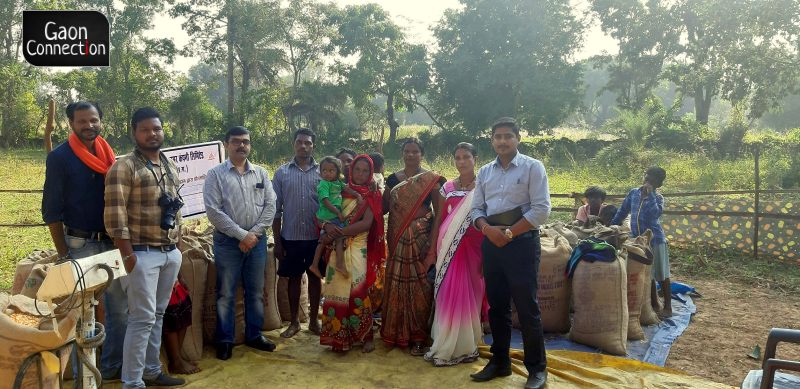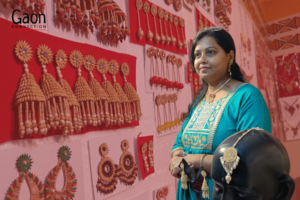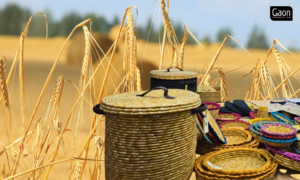To fulfil his parents’ desire, Deena Nath Rajput completed his B. Tech. degree in electronics and telecommunications engineering and took up a job in the software sector in Bengaluru. But the young native of Bilaspur in Chhattisgarh wasn’t happy as his heart was somewhere else.
Incidentally, he came across a non-profit that was working in the rural development sector. And that changed the course of his life. “The NGO members were working to take the existing government schemes to the villages,” Rajput said. Soon he quit his software job to work with the NGO.
His first task was to oversee the implementation of the Swachh Bharat Mission in the Mungeli district of Chhattisgarh. His efforts bore fruits when Mungeli was awarded the first open-defecation free (ODF) district in the state in 2018 by the prime minister’s office. “The district collector received one crore rupees prize, and I was given the award of ‘best karmachari’ by the zilla panchayat,” he said with pride.
Also Read: Tribal women from Koraput make a clean sweep with traditional brooms
Organising rural women as an FPO
During this time, the engineer-turned-karamchari got to know about some tribal women farmers in Bastanar block of Bastar district, who had formed a cooperative to sell turmeric and amchur (mango powder). Rajput, who came from an agricultural background, had a soft spot for farmers. “When I first came here [Bastar], I saw that the farmers were poor and unable to connect to the market to sell their produce.”
“I thought – ‘let’s form an FPO [Farmer Producer Organisation]. It would ensure a fair price for their produce – the tribal here depend on agriculture and forest goods. They did not have the skills for other kinds of work,” he narrated to Slow Bazaar.
Rajput diligently studied the concept of Farmer Producer Organisation (FPO) and along with 337 tribal women of Bastar formed an FPO to market and sell their produce. He named the FPO ‘Bhumgadi’, which in the Chhattisgarhi language means that which is born from the earth. Bhumgadi established a “Kharidi Kendra” (sale centre) nearby to sell the products as a connection to the market was unavailable.
“The first year, I interacted with the farmers, I learned about their problems, and resolved them,” he said. “I taught them how to properly till the land, use of fertilisers, knowledge of weather, and familiarised them with government schemes for farmers,” he added.
Within a span of a few years, Bhumgadi expanded to three districts –Bastar, Naranyanpur, Kanker – and now includes 6,100 farmers. It sells 32 types of fruits like banana, papaya; agricultural products like maize, wheat, green and black gram; forest products like tamarind, amchur, tikhur, chironji, medicinal plants; and finer products like tamarind sauce, millet products under a retail market called Hariyar Bastar. The retail goods are also sold in Raipur, Delhi, Visakhapatnam, and Hyderabad. Bhumgadi will soon start operations in Bijapur.
Farmers as shareholders
All the member farmers are shareholders in the FPO. They reap 30 per cent dividend plus have a share in the profits. “They get all the services entitled through an FPO like better price than the market, agricultural equipment, seeds, capacity building and mobilisation, procurement centre,” explained Rajput.
The success of Bhumgadi has enabled the farmers to get the right price for their produce and escape the web of intermediaries. Rajput informed the FPO also aids in training, mobilisations, and capacity building of farmers.
Bastar Café
Besides establishing a retail market for the produce, Bhumgadi has also started a café called Bastar Café in Jagdalpur to sell “finer products from the produce”.
“We sell coffee produced in the Darbha region, local tea varieties, food items made from millet like dosa, idli, tribal foods, and fresh fruit juices in the café,” said Rajput. Besides, tribal artists are also given a platform at the café to showcase their art, music, and dance.
Bhumgadi incurred some losses in the early days of the pandemic as proper delivery channels were not in place. Then the Bastar district administration swung into action and helped Bhumgadi sell their produce.
“They eased the lockdown rules for us. So, the FPO was able to deliver the products to the consumer’s doorsteps availing e-rickshaw services,” said Rajput. They also judiciously used WhatsApp to link consumers to producers.
Also Read: Beekeeping gives the Santhal tribal women in Banka, Bihar, a sweet taste of success
However, some challenges remain. Rajput said that they have not been able to completely get rid of the middlemen. “They tried to hamper our operations by disrupting transport and supply of gunny bags for the produce.”
“But we have created awareness of how middlemen fool the farmers and give them less price for their produce,” he said.
The reluctance of tribal people to take to the electronic transaction is also a challenge. “They prefer taking only cash and that presents a huge challenge when large transactions are involved,” said Rajput. It is also a challenge when the FPO files for legal compliance, he added. Rajput has been working to engage tribal communities with banking correspondents to work it out.
Also Read: Using indigenous seeds to sustain livelihoods, fight climate change and pay off loans


















